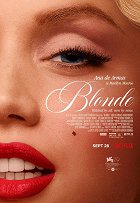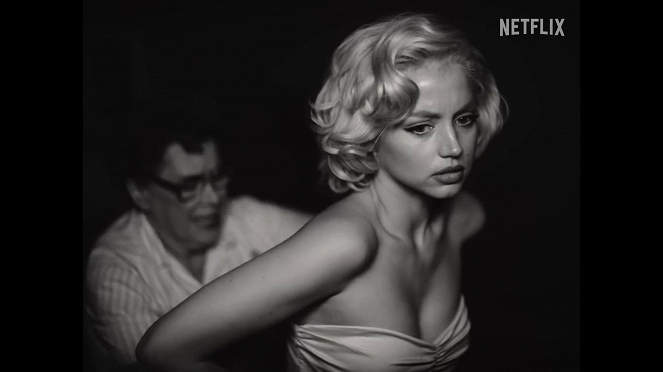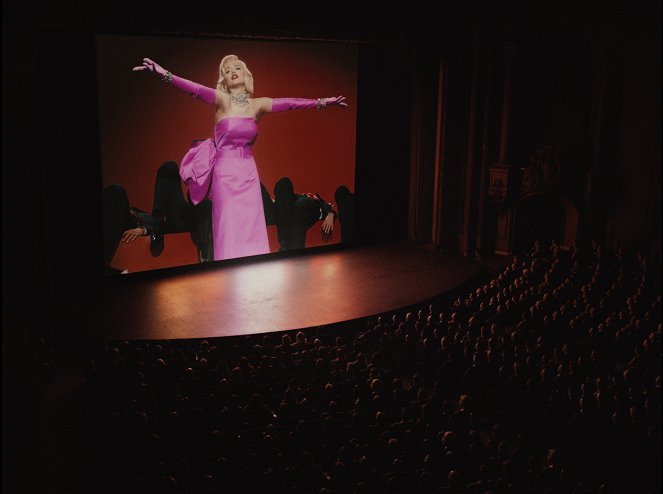Regie:
Andrew DominikDrehbuch:
Andrew DominikKamera:
Chayse IrvinBesetzung:
Ana de Armas, Bobby Cannavale, Adrien Brody, Julianne Nicholson, Xavier Samuel, Lucy DeVito, Sara Paxton, Garret Dillahunt, Scoot McNairy, Toby Huss (mehr)Streaming (1)
Inhalte(1)
Based on the bestselling novel by Joyce Carol Oates, Blonde boldly reimagines the life of one of Hollywood’s most enduring icons, Marilyn Monroe. From her volatile childhood as Norma Jeane, through her rise to stardom and romantic entanglements, Blonde blurs the lines of fact and fiction to explore the widening split between her public and private selves. (Venice International Film Festival)
(mehr)Videos (2)
Kritiken (9)
Das Umschreiben einer Romanbiografie ist an sich schon eine problematische Kategorie. Ich habe das Buch von Joyce Carol Oates schon vor Jahren verworfen, weil es eine Abfolge von abstrusen Gedanken war, aber die Filmemacher fanden es interessant, gerade dieses Material zu nehmen und darauf den experimentellen Blick auf das Leben der ewig unglücklichen Marilyn Monroe zu stützen. Wer die Epoche und die alten Filme nicht kennt, dem sagt das nichts. MM-Fans und -Kenner bevorzugen nach wie vor jedes andere Biopic (einschließlich des problematischen My Week With Marilyn), den anderen kann dieses Netflix-Event völlig egal sein. Blonde ist nur eine weitere überflüssige Geschichte. Vielmehr ist es wichtig, darauf hinzuweisen, dass Filme über oder mit MM seit ihrem frühen Tod im Entstehen sind, somit stellt dieser nichts Neues dar.
()
Ein TV-Gefühlfilm. Ein Mosaik von "Erlebnissen" einer jungen Frau voller Kummer, die ihre eigene Identität und ihren Platz in der Welt sucht. Die Stimmung ist fesselnd. Der Film ist aber nicht besonders informativ und daher überflüssig lang. Der ständige unlogische Wechsel von Bildformaten und bunten und schwarzweißen Szenen entspricht der verwirrten Psyche der Protagonistin. Ein einfacher, aber origineller und ziemlich gut funktionierender Trick. Ana de Armas ist exzellent, ergeben und gefühlvoll. Ein Film, den ein breites Publikum nicht zu schätzen weiß, hat ihre große Mühe eigentlich nicht verdient. Andrew Dominik hat als Künstler etwas für sich, er ist aber NICHT Terrence Malick.
()
Ich kann mich nicht entscheiden, ob dieser Film so gut oder so schlecht war. Über eine Sache muss ich aber gar nicht nachdenken, und zwar über die Schauspielleistung von Ana de Armas. Deshalb bin ich eigentlich nicht überrascht, dass der Film Nominierungen für die Goldene Himbeere erhielt, aber Ana eine Oscar-Nominierung. Dies unterstreicht nur den gesamten Widerspruch. Schließlich werde ich wahrscheinlich mit einem gewissen Zeitabstand den Film als positiv wahrnehmen. Er wurde zwar sehr ungewöhnlich gedreht, die Schauspielleistungen sind aber präzise und die Musik vom Magier Nick Cave passt ausgezeichnet. Ana wird den Oscar bestimmt irgendwann mal bekommen…
()
Andrew Dominik recreates the heavy atmosphere surrounding Norma Jean’s horrific life right from the very first scene, with Hollywoodland in flames. His work with the picture, alternating cameras, colors and lighting and even picture size surprisingly enhances the storytelling, rather than being a distraction. Ana de Armas’ performance is fantastic, styled as housewife on the brink of madness, slash promiscuous movie star. The way the story is broken up into separate scenes is sometimes confusing, but necessary, otherwise the movie would have to last four hours. The dream and drug sequences at the end are a delight. The premiere of Some Like It Hot ("I Love Love Love You All") with the monster photographers is the high point of the whole movie. It is certainly more watchable than Mank, but Blonde just isn’t a movie for everybody. If you let it, it’ll swallow you whole. P.S.: The White House scene is far from a disappointment!
()
Blonde is an exceptional work for the same reasons many people hate it: its fragmentation, the excessive length of many scenes, the focus on the surface, the inconstant visual identity, the building of pressure without catharsis, it’s not an empathetic biopic but a pessimistic collection of horrors with a dissociated protagonist who wanders through her own subconscious – the whole film can be seen as her nightmare (also, the Badalamenti-esque soundtrack by Nick Cave and Warren Ellis is reminiscent of Lynch, who had prepared and ultimately shelved a film about Marilyn Monroe in the 1980s). The breaking down and decontextualisation of the myth and iconography of Marilyn Monroe work better in images than in Joyce Carol Oates’s graphomaniacal book on which the film is based (though the film uses the book’s narrative and storyline relatively consistently, its nihilism is closer to Ballard or Palahniuk). I understand that sexual violence, nervous breakdowns and ideas outside the boundaries of taste (a foetus talking to its mother) may be too much for some. I understand that not everyone will accept the concept of a film in which beauty is almost always associated with pain and sex with humiliation, a film that places the viewer in the extremely uncomfortable position of voyeuristic accomplice. However, I would expect critics to at least have the ability to distinguish between a real historical figure and a textual construct that serves a certain narrative or symbolic purpose, or rather between a misogynistic film and a film about misogyny (and the cruelty of the looks that strip a person of their identity and turns one into a projection screen for someone else’s fantasies). 90%
()



Werbung